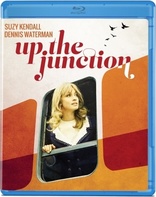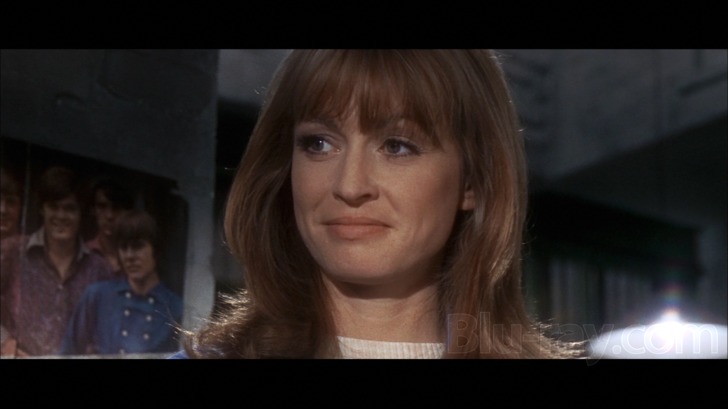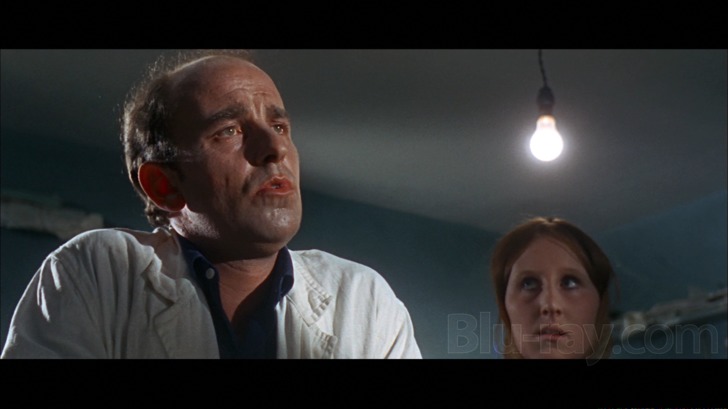Up the Junction Blu-ray Movie
HomeUp the Junction Blu-ray Movie 
Olive Films | 1968 | 119 min | Rated R | Apr 29, 2014
Movie rating
7.4 | / 10 |
Blu-ray rating
| Users | 0.0 | |
| Reviewer | 3.5 | |
| Overall | 3.5 |
Overview
Up the Junction (1968)
Based on Nell Dunn’s iconic tale of life in London’s swinging sixties, Up the Junction is a memorable slice of British cinema starring Suzy Kendall (Tales That Witness Madness) as Polly and Dennis Waterman (TV’s The Sweeney) as her hard-up boyfriend, Pete. The tale is of a bored, young party girl who decides to cast off her affluent Chelsea lifestyle to move to the industrialized ghetto of Battersea. In search of realism, Polly takes a factory job where she befriends sisters Rube (Adrienne Posta) and Sylvie (Maureen Lipman) and moves into a rundown apartment in the area. She soon discovers the seedier side of life in an impoverished world of crime, desperation and questionable morality–a side of life that everyone but Polly is desperately trying to leave behind. This beautiful and haunting film was directed by cult-filmmaker Peter Collinson (Innocent Bystanders, The Italian Job).
Starring: Suzy Kendall, Dennis Waterman, Maureen Lipman, Adrienne Posta, Liz FraserDirector: Peter Collinson
| Drama | 100% |
Specifications
Video
Video codec: MPEG-4 AVC
Video resolution: 1080p
Aspect ratio: 2.35:1
Original aspect ratio: 2.35:1
Audio
English: DTS-HD Master Audio Mono
Subtitles
None
Discs
25GB Blu-ray Disc
Single disc (1 BD)
Playback
Region A (B, C untested)
Review
Rating summary
| Movie | 3.5 | |
| Video | 4.0 | |
| Audio | 4.0 | |
| Extras | 0.0 | |
| Overall | 3.5 |
Up the Junction Blu-ray Movie Review
To her, with love.
Reviewed by Jeffrey Kauffman April 9, 2014To Sir, With Love was a 1967 film with a wonderful tag line that stated:
A story as fresh as the girls in their minis. . .and as cool as their teacher had to be!Still fondly remembered today, especially by those who grooved to the sounds of Lulu’s chart busting rendition of the theme song, a single which actually became the number one record of 1967 according to Billboard (trivia lovers may be interested to hear it’s the sole time in chart history that a song by a British artist has reached Number One in the United States while failing to chart at all in the United Kingdom), To Sir, With Love recounted the stories of some ragtag East London students, most from working class backgrounds and few with any prospects for a decent future. Into their lives comes a California teacher played by Sidney Poitier in his typically resolute, understated but elegant style. While another 1967 film, the United States set Up the Down Staircase, trafficked in some of the same general ideas like hardscrabble youth learning to appreciate the finer things in life courtesy of a caring teacher, there’s actually another British film which appeared a bit later than either of these classroom set outings which is tangentially linked to To Sir, With Love. 1968’s Up the Junction actually opened to almost uniformly positive reviews (albeit with a few caveats sprinkled in—you know how critics can be), but then quickly disappeared, failing to gain much traction in either the United Kingdom or the United States. Few others than a handful of fans probably remember it to this day, though it, like To Sir, With Love, offers a genteel interloper becoming involved with blue collar types, this time in the South London region of Battersea. Up the Junction is a bit more discursive than To Sir, With Love—it actually only lets the audience in on its central conceit slowly over time, unless one is really paying attention to footage running under the credits—but it’s a fascinating study in class differences and some British social structures nonetheless. Starring one of To Sir, With Love’s featured players, Suzy Kendall, as well as co-starring some of the earlier film’s supporting players, there’s a lot of the same tone and substance if not actual plot similarities in Up the Junction to To Sir, With Love. Much as Poitier’s character, ostensibly the teacher in the film, gets schooled himself by his students, Up the Junction’s Polly Dean (Suzy Kendall) gets some valuable life lessons of her own when she leaves her prosperous Chelsea life to experience how the other half lives— and loves.

Up the Junction is in its own way a rather peculiar mash up of the then waning “Angry Young Man” genre with the then burgeoning Mod ethos that was sweeping London and points beyond. Polly exits her chauffeur driven limousine on a bridge over the Thames one day and simply shows up at a grimy candy factory, where without much explanation, she asks for a job. While it’s obvious Polly is manifestly more cultured than her new co-workers, she blends in rather seamlessly, especially after she goes to lunch with some of the younger women, emerging from the café arm in arm with two of them. While some of the characters here might be angry young women (or at least not especially well educated, lower caste types), there's also a feeling of newness in the air, and not just because Polly has thrust herself into a different environment. Set to some great tunes by Manfred Mann, there are a series of montages that seem to suggest Polly is a kind of amateur anthropologist, living among an unexplored species to formulate some kind of hypothesis on their day to day habits. (The film was based on a series of articles by journalist Nell Dunn, who did indeed live among factory workers and then wrote about them. Her musings were later compiled into book form.)
Polly rather quickly falls in with Rube (Adrienne Posta) and Sylvie (Maureen Lipman), neither of whom are shy about discussing the intimate details in their lives and who accept Polly rather quickly for the obviously better educated and more proper outsider that she is. Polly also manages to find a dilapidated but somehow still charming apartment that she immediately rents, and it also isn’t that much longer until she’s become involved with a curt local man named Pete (Dennis Waterman), a guy who certainly would have been completely at home in any Angry Young Man enterprise of the prior decade.
In fact it’s the rather redacted quality of Up the Junction which may be its biggest drawback. Perhaps the filmmakers were counting on the British audience’s previous familiarity with Nell Dunn’s articles and books, which were something of a cause célèbre at the time, but for American audiences more used to having things spelled out completely for them, the film may seem too condensed for its own good. However, putting aside that perhaps negligible qualm, a rather surprising amount of emotion is built up by the time a couple of tragedies invade Polly’s life, first tangentially and then a bit closer to home.
Up the Junction is definitely a product of its era, though in a rather interesting way. It’s unusual, to say the least, to see a kind of gritty lower class take on “Mod” London, but that’s actually what the film offers at times (including with a nice sequence detailing Polly’s own makeover into then au courant fashion trends). And the film is also decidedly forward thinking in its rather frank discussions about sex and relationships, especially when one considers the talking is done almost exclusively by the young women in the film. The song score by Manfred Mann is quite enjoyable, making several sequences play out like proto-music videos. Director Peter Collinson (who did the original version of The Italian Job right after this film) keeps things surprisingly real feeling, eliciting good, unvarnished performances from a largely young but very capable cast.
Up the Junction Blu-ray Movie, Video Quality 

Up the Junction is presented on Blu-ray courtesy of Olive Films with an AVC encoded 1080p transfer in 2.35:1. Perhaps because this film never really took off domestically (as in Britain) or internationally, the elements are in great shape, with only very minimal issues like transitory specks occasionally showing up. Color is surprisingly robust, though occasionally slightly variable (contrast the skin tones in various screenshots for some examples). The image is very natural and organic looking (as is the custom with these Olive releases), with appropriate levels of grain and a stable and reasonably clear looking image. Contrast and black levels are also very good and consistent throughout the presentation, and (again as with virtually all Olive releases) there's absolutely no evidence of digital manipulation of the image.
Up the Junction Blu-ray Movie, Audio Quality 

Up the Junction's lossless DTS-HD Master Audio Mono mix is similarly great sounding, though the music was obviously given priority in several key sequences, meaning it's far more forward than contemporary audiences might be used to. (This was sadly the beginning of the end of Manfred Mann's hitmaking years, though their efforts here are extremely worthwhile, at times sounding a bit like The Beach Boys or even presaging some of what The Association would contribute to 1969's Goodbye, Columbus). While the accents can be a bit hard to decipher at times (and like most Olive releases, this one does not have subtitles), dialogue is presented cleanly and clearly. The track has no overt damage to report.
Up the Junction Blu-ray Movie, Special Features and Extras 

There are no supplements on this Blu-ray disc.
Up the Junction Blu-ray Movie, Overall Score and Recommendation 

This "slice of life" feature is surprisingly charming, if occasionally a bit too fast to simply thrust its main character into various situations. Up the Junction features a slew of excellent performances and provides a neat look at a different side of late sixties London. While the film's central conceit of a wealthy young girl more or less imposing herself on less fortunate types might seem too contrived to ever generate any interest, under the sure, unobtrusive direction of Collinson, the story actually becomes rather engrossing, to the point that two central crises later in the film actually provide an unexpected amount of pathos. The song score by Manfred Mann is also a big plus. Olive's presentation here is generally excellent, and Up the Junction comes Recommended.
Similar titles
Similar titles you might also like

Nil by Mouth
1997

Cavalcade
80th Anniversary / Fox Studio Classics
1933

Alfie
1966

Mr. Selfridge: Season 4
2015

Husbands
1970

Tom at the Farm
Tom à la ferme / English packaging / Version française
2013

My Beautiful Laundrette
1985

Rita, Sue and Bob Too
Limited Edition to 3000
1987

There Be Dragons
2011

Hereafter
2010

Radio On
Standard Edition
1979

360
2011

To Sir, with Love II
1996

Black Narcissus
1947

Smiley's People
1982

Great Expectations
2012

The Other Woman
Love and Other Impossible Pursuits
2009

100 Streets
One Square Mile
2016

I, Daniel Blake
2016

X, Y and Zee
Limited Edition to 3000
1972